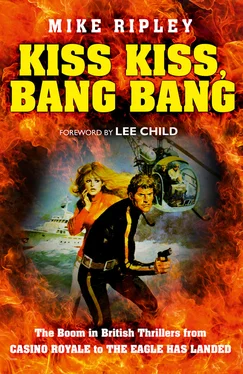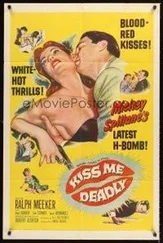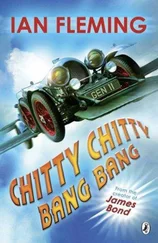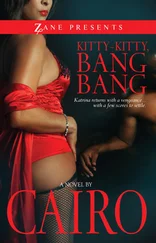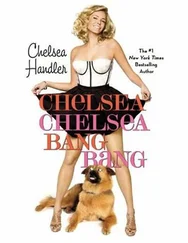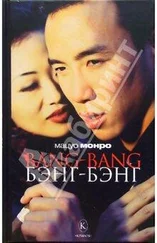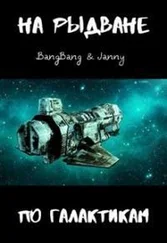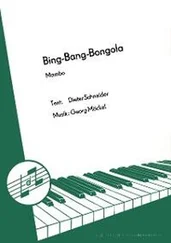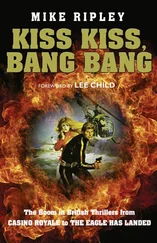How could British thriller writers cope with the changing world order? The Empire was fading and no longer would provide a nursery for adventure heroes as it had in the days of Rider Haggard or John Buchan. 6One of the last of that generation of fictional heroes who had a ‘colonial’, though not privileged, upbringing was probably Idwal Rees, as created by Berkely Mather in The Pass Beyond Kashmir in 1960. Although proud of his Welsh heritage (as was Mather), the bulk of Rees’ early life had been spent far away from Wales (as had Mather’s) and he introduces himself to the reader thus:
My old man had been the Far Eastern correspondent for a London paper and he never seemed to have any money so I had spent all my life up till 1939, and much of it afterwards, in India, Burma and China … the man who says he really knows the Far East is talking through his hat but I can claim to know just enough about the undercurrents to get by and to earn my modest fees. I’m built on wiry lines and sun and fever have burned my naturally dark hide to a uniform teak colour which makes me inconspicuous in most company where the features aren’t Mongolian – that’s if I’m dressed the same way. I’m not a master of disguises but if you look like me and can speak Cantonese and Hindustani with a bit of kitchen Arabic and a convincing pidgin-English with, when necessary, a bastard potpourri of the lot, you can get by as almost anything from Aden to Okinawa. Somebody who didn’t like me once spread it around that I was half Bengali. That wouldn’t worry me if it were true, but it’s not. I’m pure Welsh on both sides.
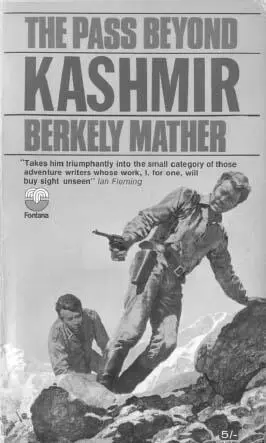
The Pass Beyond Kashmir , Fontana, 1969
A character Kipling would have warmed to, one feels sure.
The imperial network of trading, cultural, and legal links as well as job opportunities were formative influences on the lives of many a British thriller writer, let alone actual ‘colonials’ such as Wilbur Smith and Geoffrey Jenkins, who instinctively turned to the mother country when seeking a publisher. Before WWII, William Haggard had been a career civil servant and magistrate in India, and Francis Clifford had been in the rice trade in China and Burma. Desmond Bagley had left England in 1947 and after an epic journey across the Sahara to Uganda, eventually settled in South Africa until 1964. Another journalist, Barry Norman, who was to become the nation’s favourite film critic after trying his hand at thriller-writing, also worked in newspapers in South Africa.
Many more, of course, had visited or been stationed in the colonies whilst on active military service but peacetime National Service in the Fifties offered less exotic, albeit safer, opportunities for gathering colourful background material, although Jack Higgins and the award-winning crime writer Reginald Hill (who was to occasionally dabble in spy thrillers) no doubt had their horizons broadened whilst serving with the British army on the border between West and East Germany.
True, Britain’s armed forces still had a reputation for professionalism and bravery – and tough secret agents such as James Mitchell’s David Callan had learned their deadly skills in the army, fighting communist insurgents in Malaya – but now there were fewer gunboats to spare to send to foreign hot spots and everyone knew that only America could actually afford to pay for a war. After all, Britain was still paying for the last one, its WWII debt repayments only completed in the twenty-first century. And Britain’s intelligence services seemed ill-equipped to play any effective part in the Cold War, riddled as they were by some of the best (Cambridge) educated traitors in the world.
So without an Empire to defend, no real power to wield or misuse, and security services that were far from secure, what was the British thriller writer to do for inspiration?
The answer was blindingly obvious – especially to the many would-be authors who had journalistic backgrounds – never let the facts spoil a good story. Britain had won the war, it still ruled the waves and when the world was in trouble, there would always be a British hero to save the day. In fact, writers almost had a patriotic duty to reassure readers that Britain still mattered on the world stage, even if it could not actually afford to compete in the accelerating arms race between America and the Soviet Union.
The economy may be a mess, its spies defecting to Russia in droves, its armed forces humiliated at Suez and its Empire going, if not gone; but dash it all, we had put up a jolly good show during the war, hadn’t we? We had stood alone, bravely and defiantly, and kept smiling through as our ships were torpedoed and our cities blitzed. We had marched into battle as if striding out to the crease and even when captured we had been determined to escape by the most ingenious (preferably cheekily humorous) method possible.
The British had punched above their weight during the war and, although the world had changed and the villains were different, there was no reason why, when heroes were needed, they should not come from plucky Britain with the advantage of usually being underestimated by an arrogant enemy.
In 1957, in From Russia, with Love , Ian Fleming wryly allowed a Soviet spymaster to display his ignorance of the British (‘English’) psyche. The character is General Vozdvishensky of the Intelligence Department of the Soviet Foreign Ministry and he is addressing a meeting of Russian spy agencies planning the elimination of James Bond:
The English are not interested in heroes unless they are footballers or cricketers or jockeys. If a man climbs a mountain or runs very fast he also is a hero to some people, but not to the masses … But the English are not greatly interested in military heroes. In England, neither open war nor secret war is a heroic matter. They do not like to think about war.
The good general had only to look at what the ‘English’ were reading that year (apart from From Russia, with Love that is), namely Alistair MacLean’s The Guns of Navarone , and what they were queuing to see at the cinema, The Bridge on the River Kwai , to see how badly he had misjudged them when it came to military heroes. True, he was right when it came to climbing mountains, as when Edmund Hillary (albeit a New Zealander, as was Keith Mallory the mountaineer leader of the mission to spike those pesky guns on Navarone) had conquered Everest in 1953, and about men running fast, as Roger Bannister proved by breaking the four-minute mile barrier in 1954. English footballers and cricketers certainly could and still do become national heroes, even if only briefly, and in 1956, a certain jockey, Dick Francis, became a tragically heroic figure when his mount, the Queen Mother’s horse Devon Loch, collapsed fatally within sight of the finish of that year’s Grand National. Dick Francis was to go on to become if not a hero, then certainly a National Treasure, when he began to write bestselling thrillers at a steady gallop virtually every year from 1962 to the end of the century and beyond.
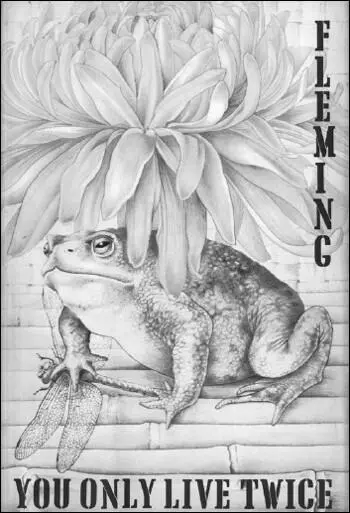
You Only Live Twice , Jonathan Cape, 1964, illustrated by Richard Chopping
To emphasise that it was always dangerous to underestimate the British, Ian Fleming returned to the point in You Only Live Twice in 1964. James Bond is in Japan trying to get the Japanese secret service to provide access to intelligence which the Americans (clearly worried about double agents such as Kim Philby) are refusing to share. Bond befriends the top Japanese spy Tiger Tanaka, but before he agrees to anything, Tanaka tests Bond, not by torture or threatening a female (methods we know don’t work on 007), but by criticising the British in a way which could have come out of the KGB handbook – or even the mouth of a former Colonial Officer now retired to Tunbridge Wells or possibly Bournemouth:
Читать дальше
